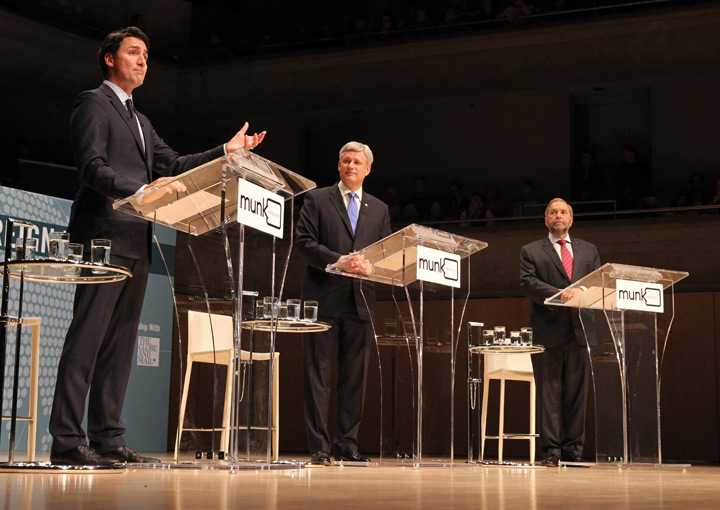Monday night’s Munk debate was the liveliest of the campaign, and provided an opportunity to compare the positions of the different parties on various foreign policy issues.

READ MORE: Debate was leaders’ job interview for international statesman
Here’s some of what we learned. If these ideas seem eerily familiar it’s because we’ve heard them before (what can you do? It’s an 80-day campaign), but during this debate leaders offered the reasoning behind their positions.
1. The NDP would use military force only in United Nations-sanctioned missions, or to meet international obligations under the NATO Charter
NDP leader Thomas Mulcair has said he’d end Canada’s military mission fighting ISIS in Iraq and Syria. So when would he use military force?
Only when the mission was sanctioned by the UN or required under NATO, he said.
“We understand there will be times when we have to, either under the NATO Charter or under our international obligations with the UN, to use force, and we won’t shy away from that. But the real question here is is that the only thing that we can do?”
Mulcair argues Canada could do more to help refugees, stop the illicit weapons trade, and stop the flow of funds and foreign fighters to terror groups.
Conservative leader Stephen Harper disagreed.
- Alberta to overhaul municipal rules to include sweeping new powers, municipal political parties
- Grocery code: How Ottawa has tried to get Loblaw, Walmart on board
- Military judges don’t have divided loyalties, Canada’s top court rules
- Norad looking to NATO to help detect threats over the Arctic, chief says
“The reason we’re also involved in the aerial campaign is, through much of Iraq and Syria there is, in fact, no ground resistance to ISIS. And the only way to keep them back, to hold them back, keep them in their positions and keep them from simply being able to sit back and plan attacks against us is to keep the military pressure on them.”
2. A Liberal government would add oversight to terror law
Liberal leader Justin Trudeau defended his decision to vote for anti-terror Bill C-51 despite his reservations about parts of it.
He said a Liberal government would add sunset clauses on the legislation and increase oversight of national security agencies like CSIS.
“It is about ensuring that yes, those police powers aren’t overused and abused, that we’re making sure that we are upholding the Charter rights of every individual. But at the same time, it’s also about holding our national security agencies and police to account, to make sure that they are actually protecting us in every possible way. And we need to trust elected parliamentarians to do that job, not simply appointed officials answerable to the Prime Minister.”
A Liberal government would give parliamentarians that oversight power, he said, although he didn’t specify how that would work and what degree of information parliamentarians would get about classified CSIS operations.
3. The Conservatives’ maternal health initiative avoided abortion and contraception to ensure broad support
Conservative leader Stephen Harper was criticized by both Trudeau and Mulcair for his government’s international maternal and newborn health initiative, which didn’t include improving women’s access to abortion and contraceptives.
Harper said the government didn’t want to get into that contentious debate.
“You can’t go out in the world and unite the range of countries we have, and independent and third party organizations, NGOs that we have, and get into that kind of a debate. You need to concentrate on the things that unite people. Saving the lives of mothers and their newborns around the world is a cause that has united people, on which we have made real progress, and we need to keep going in that direction.”



Comments